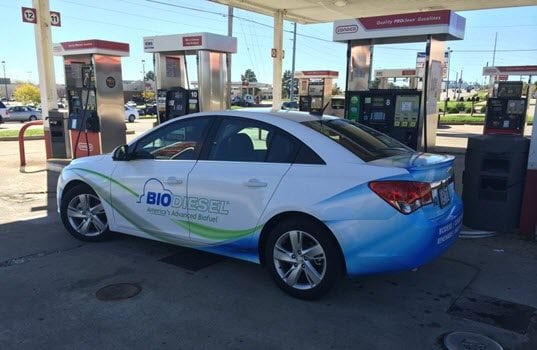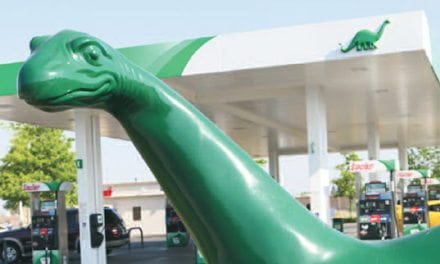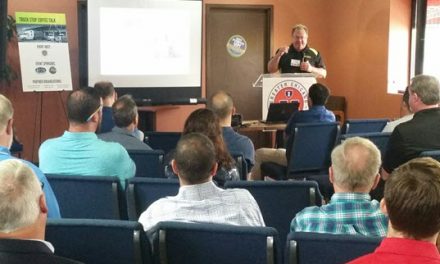By Paul Nazzaro
It was only 23 years ago that a University of Missouri researcher powered a pickup truck on oil squeezed from soybeans and the National Soy Diesel Development Board, today known as the National Biodiesel Board, was formed with seven members from four Midwestern states. Two decades later, the NBB boasts more than 250 company members from nearly every state and represents an industry with the registered capacity to produce some three billion gallons of fuel.
And yet the NBB will be the first to admit that the U.S. biodiesel industry is facing uncertain times. With the EPA now more than two years late in establishing volume mandates for biodiesel under the Renewable Fuel Standard not—to mention its recent decision to effectively streamline biodiesel imports from Argentina—and with no clear answers from Congress on when or how the biodiesel tax incentive will be reinstated, domestic production has declined and many are calling into question the industry’s future.
So what else is new? Navigating uncertainty has been the modus operandi of the NBB since its founding. If it hasn’t been policy uncertainty, it’s been quality uncertainty. If not uncertainty over how to handle and blend it, uncertainty over how to market and monetize it. Educating lawmakers, industry leaders and consumers on the benefits and operability of biodiesel has been at the heart of the NBB’s work.
And apparently, it’s been working.
The NBB has been the driving force behind dozens of industry milestones, including state and federal biodiesel mandates, the emergence of Bioheat® as an ASTM-approved heating oil and biodiesel’s distinction as the first and only EPA-designated Advanced Biofuel being produced on a commercial, nationwide scale.
Achieving those milestones hasn’t been easy. It has taken a tremendous amount of technological innovation, entrepreneurial risk and collaboration between partners from diverse sectors who have recognized the need for a clean, homegrown renewable fuel. It has required the effective leadership, messaging and advocacy of the NBB and its members. And it has demanded substantial investment, infrastructure, and government support. Until the RFS fell off track, the still-maturing industry had benefited from all of those things, enabling the production of more than one billion gallons in each of the past three years.
Despite the prevailing policy uncertainties, the manifold benefits of biodiesel, which have been the true drivers of its growth, are as relevant today as ever. Made from an increasingly diverse mix of resources such as recycled cooking oil, agricultural oils, and animal fats, biodiesel is renewable, reduces greenhouse gases and harmful air pollutants, decreases our dependence on foreign oil, and supports roughly 60,000 jobs across the country. That’s why, in February, a bipartisan group of 32 U.S. senators called for the EPA to quickly approve strong biodiesel volumes under the RFS, and a survey of 1,200 U.S. voters found that biodiesel policy has overwhelming public support.
The recent public survey serves as another reminder of how far the industry has come. Had the survey been conducted just 20 years earlier, biodiesel would have been a foreign concept to every person asked. In the time since, the NBB has navigated the industry through constant adversity to advance the interests of its members and secure biodiesel’s place in the national energy landscape as the most sought-after blend stock for diesel fuel and heating oil distributors alike. As the distributors who have long embraced biodiesel know, the challenges of today, as evidenced by those of yesterday, will only serve to make the industry, and ultimately their businesses, stronger tomorrow.
The good news is that delays in policy are the only factors holding the industry back. If the EPA delivers on its promise of proposing increased RFS volume requirements this spring, and if the tax incentive is extended (as it has been for the past several years), biodiesel is poised to continue on its upward trajectory towards comprising 10% of diesel fuel demand by 2022, as the NBB projects.
The industry has proven that it has the production capacity, infrastructure, and public backing in place to support the continued growth of this important national commodity.
The NBB, its members, and some 60,000 workers are just waiting for the word.
 Paul Nazzaro is the founder of the Nazzaro Group that provides consulting services, renewable energy, market analysis, fleet management, fuel quality assessments, supply chain management development, sales and technical training. He is also the president of Advanced Fuel Solutions, Inc. that provides insight on fuel quality and management programs. He also serves as the NBB petroleum liaison and program manager.
Paul Nazzaro is the founder of the Nazzaro Group that provides consulting services, renewable energy, market analysis, fleet management, fuel quality assessments, supply chain management development, sales and technical training. He is also the president of Advanced Fuel Solutions, Inc. that provides insight on fuel quality and management programs. He also serves as the NBB petroleum liaison and program manager.








